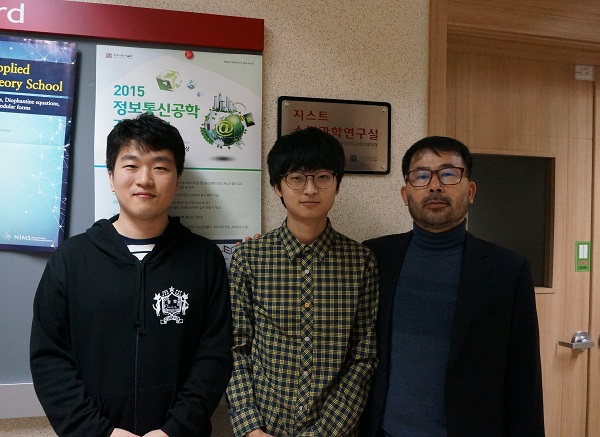Media Center
A multimedia mosaic of moments at GIST
GIST Excellence
[Press Release] GIST College Professor Chi-Ok Hwang publishes SCI-level paper with his undergraduate students
- 엘리스 리
- REG_DATE : 2016.01.07
- HIT : 795
GIST College Professor Chi-Ok Hwang
publishes SCI-level paper with his undergraduate students
GIST College professor and his students develop a new off-centered
"Walk-on-Sphere" (WOS) algorithm to replace the previous WOS algorithm
for improved diffusion Monte Carlo methods

(From left) GIST College students Sungpyo Hong, Jinwoo Kim, and Professor Chi-Ok Hwang
GIST College Professor Chi-Ok Hwang has published a SCI-level paper with two undergraduate students, senior Sungpyo Hong who is majoring in physics and sophomore Jinwoo Kim who is in the general studies program. Their paper entitled "Off-centered "Walk-on-Spheres" (WOS) algorithm" was published online in the Journal of Computational Physics on October 8, 2015.
Their research introduced a more efficient off-centered WOS to replace the WOS algorithm. The WOS algorithm is the simplest and most efficient class of diffusion Monte Carlo algorithms knows as the Green"s function based first-passage methods, which as the most general diffusion methods of all the diffusion Monte Carlo methods. Monte Carlo methods obtains numerical results through repeated random samplings, and these methods are often used in situations where other mathematical methods prove to be impossible or inadequate.
Professor Hwang and his students based their off-centered WOS approach on the isomorphism between the electrostatic Poisson problem and the corresponding diffusion motion expectation of the first-passage by simulating the Brownian motion (random walks) corresponding to the Laplace differential operator. They then analyzed the ε-error of their off-center WOS approach to the WOS algorithm and found that their approach to be more efficient because the probability of being terminated in the ε layer is higher. Therefore, their off-centered WOS algorithm uses a much lower average number of random diffusion jumps for all ε layers, which results in greater computational efficiency.
As Professor Hwang noted: "The development of this new off-centered WOS algorithm can replace the older WOS algorithm because the improved efficiency will help promulgate the Monte Carlo methods to other areas and applications. Thanks to the curiosity and passion of my undergraduate students who asked minor but important questions, we were able to research this idea with good results."
Their research was supported by the Basic Science Research Program through the National Research Foundation of Korea funded by the Ministry of Education, Science and Technology and by the PLSI supercomputing resources of the Korea Institute of Science and Technology Information.